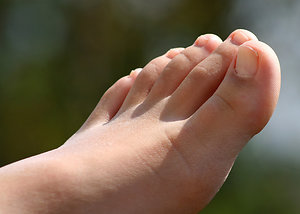I am unable to take on new clients for foot care at the moment.
Our feet are complex things they have a flexible structure of bones, joints, muscles and soft tissues all packed into a confined shape. They have to adjust to allow all the complex movements that we take for granted such as running, crouching, jumping, walking, dancing and standing on tip-toe.
Our feet carry us through life. They are so important for our over all health. In an average life time they may carry you approximately 100,000 miles- that’s two laps of the equator! We often take them for granted and just expect them to cope with all the abuse we throw at them- forcing them into fashionable shoes, play sports that cause strains and sprains and wear favoured footwear far too long.
What is a Foot Health Practitioner?
A Foot Health Practitioner's role is to help people with their foot problems. I have been trained to recognise foot conditions and to either treat them, or to recognise when I need to refer on to a Podiatrist for more specialist foot care, or to a GP when appropriate.
Podiatrist's can prescribe medication and are training to do more specialist assessments, use biomechanics to correct the way you walk or run. They can perform surgery to remove nails and use invasive treatments to try to stop verrucas.
I am able to perform routine care, cutting and filing nails correctly to keep feet comfortable and healthy, preventing ingrowing nails. I can remove callus' and corns and treat thickened nails, or painful cracked heels. Treat diabetic feet and advise on good foot hygiene.
I have 26+ years experience as a qualified nurse so have a good understanding of infection control. All of my instruments are cleaned in an ultrasonic bath and then vacuum autoclaved at 135c for at least 3 minutes as recommended. Instruments are sealed in packs during this process so that they remain sterile until used on a client. I have sufficient instruments to ensure single use for each client.
This is an important thing to be aware of when having treatment in your home, or for a resident in a care home. If anyone you ask to treat your feet does NOT open a sealed pack of instruments to treat your feet- don't let them touch your nails- fungal infections are very easy to spread from client to client if this is not done.
Care
Looking after our feet while they are healthy is so much easier than trying to help them to recover after developing a problem. Early symptoms of diabetes, arthritis, nerve and circulatory problems often initially show themselves in the feet, they are one of the most indicative signs of our overall health.
Self care
- Keeping feet clean is so important, as is drying them well after washing with soap and water.
- Wear well fitting, supportive shoes.
- Declare war on hard skin. A pumice stone or a good file will keep the dead skin off your feet.
- Calluses don’t just appear by accident. If they appear, the chances are that your shoes don’t fit properly, so that problem needs addressing if the calluses are to stop forming.
- Keep toenails trimmed to avoid the complication, and pain of ingrowing toenails.
- Change your socks or tights daily to avoid any potential infections.
- If you have poor circulation, then try to avoid elasticated socks that grip your legs and leave indentations in your skin.
- Cushioned sole socks with soft tops will give feet comfort during the day.
If you find it difficult to get down to your feet then it may be time to see a foot care professional. Click here RFHP to search on the register to find a registered Foot Health Practitioner.
Be nice to your feet - it will probably be the best investment in time and money you will ever make
Why not try a combined foot treatment and reflexology, to leave you relaxed and refreshed!






